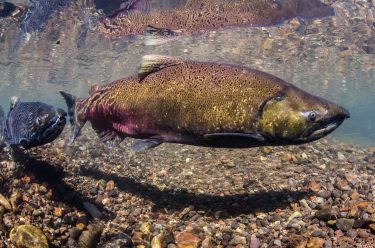
The largest and oldest Chinook salmon — fish also known as “kings” and prized for their exceptional size — have mostly disappeared along the West Coast.
That’s the main finding of a new University of Washington-led study published Feb. 27 in the journal Fish and Fisheries. The researchers analyzed nearly 40 years of data from hatchery and wild Chinook populations from California to Alaska, looking broadly at patterns that emerged over the course of four decades and across thousands of miles of coastline. In general, Chinook salmon populations from Alaska showed the biggest reductions in age and size, with Washington salmon a close second.
“Chinook are known for being the largest Pacific salmon and they are highly valued because they are so large,” said lead author Jan Ohlberger, a research scientist in the UW’s School of Aquatic and Fishery Sciences. “The largest fish are disappearing, and that affects subsistence and recreational fisheries that target these individuals.”
Read more at UW Today »
